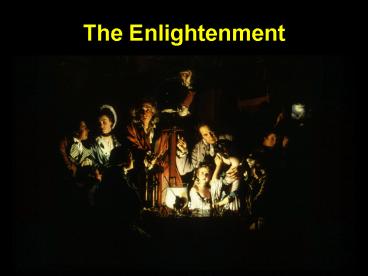The Enlightenment PowerPoint PPT Presentation
1 / 20
Title: The Enlightenment
1
The Enlightenment
2
The Enlightenment
- The Age of Reason
- Roots /influences 17th century Britain
- Developed especially in France in 18th century
(also Germany and other European countries).
3
What was the Enlightenment?
Enlightenment is mans release from
self-incurred tutelage. Tutelage is mans
inability to make use of his understanding
without direction from another. Self-incurred is
this tutelage when its cause lies not in lack of
reason but in lack of resolution and courage to
use it without direction from another. Sapere
aude! Have the courage to use your own reason!
that is the motto of the enlightenment.
(Immanuel Kant, What is Enlightenment 1784)
4
Fundamental characteristics
- Reason mans central capacity
- Progress individual and humanity as a whole
- Equality of all before the law and individual
liberty - Tolerance extended to other creeds and ways of
life - Criticism of authority of tradition and religion
(tendency towards deism and atheism) - Unity all humans share the same nature
5
The philosophes
One who trampling on prejudice, tradition,
universal consent, authority, in a word, all that
enslaves most minds, dares to think for himself
(Denis Diderot and Jean Lerond dAlembert,
Encyclopedie definition of philosophe).
6
Voltaire (1694-1778) Letters on the English
(1734)
- English scientific and philosophical thought
- Character of British government
- Most important Isaac Newtons scientific
achievement
7
Rationalism versus Empiricism
- Rationalism All knowledge rigorously deduced
from first principles - Empiricism All knowledge comes from experience
- Enlightenment reason reason based on experience,
therefore empiricism dominates
8
John Locke (1632-1704)
- English philosopher and fundamental influence on
the French philosophes - An Essay Concerning Human Understanding (1690).
9
Lockes thought and influence
- Empiricism
- Everyone at birth is like a blank sheet of
paper - Implication all men were equal at birth and
became unequal through different environmental
influences, such as the education they received
and the laws they had to obey
10
The Encyclopedie (1751-1777)
- The most important document in the French
Enlightenment - 22 volumes edited by Denis Diderot (1713-1784)
and Jean Lerond dAlembert (1717-1783)
11
- Numerous articles technology, religion, law,
literature, mathematics, philosophy, chemistry,
military science and agriculture. - Vast amount of accurate information
- To bring together all the knowledge scattered
over the surface of the earth, and thus to build
up a general system of thought, so that the works
of past ages shall not be useless, and our
descendants becoming more instructed, shall
become virtuous and happier (Diderot).
12
Science in the Enlightenment
- Many thought that the 17th century Scientific
Revolution was to be completed in the 18th - One major development the Chemical Revolution
- A typical enlightenment project undermining
authority through experience, particularly
experimentation
13
The Chemical Revolution
- Centred on the discovery of oxygen
- Undermines Aristotles conception of the elements
- Undermines the prevailing theory of combustion
(the phlogiston theory)
14
Joseph Priestly (1733-1804)
- Discovers a new air
- A constituent of ordinary atmospheric air
- Ordinary air differentiated
15
Antoine Lavoisier (1743-1794)
- Scientist, civil servant, administrator, tax
collector - Oxygen theory of combustion
- Water is not an element
16
Experiments on respiration. 1790-91.
17
A Science of Humanity
- Scientific understanding of human nature would
reveal how societies work, which would provide a
scientific basis for the rationalisation and
reform of social and political institutions - Social science Anne-Robert-Jacques Turgot
(1727-1781) and the Marquis de Condorcet
(1743-1794)
18
Claude Adrien Helvétius (1715-1771)
- there are inequalities in our capacity to judge
effectively - adopted Lockes theory of the mind
- reform the educational and legislative systems
necessary to the improvement of mankind
19
David Hume (1711-1776)
- human nature displayed the same regularity and
uniformity as the physical world - where experiments from cautions observations of
human life are judiciously collected and
compared, we may hope to establish on them a
science, which will not be inferior in certainty,
and will be much superior in utility to any other
form of human comprehension Treatise on Human
Nature (1739-1740).
20
Montesquieu (Charles de Secondat) (1689-1755)
- Spirit of the Laws (1748)
- human temperament varied according to climate
- human nature governed by natural laws that
underlay the confusion of customs and privileges
that emerged in history

